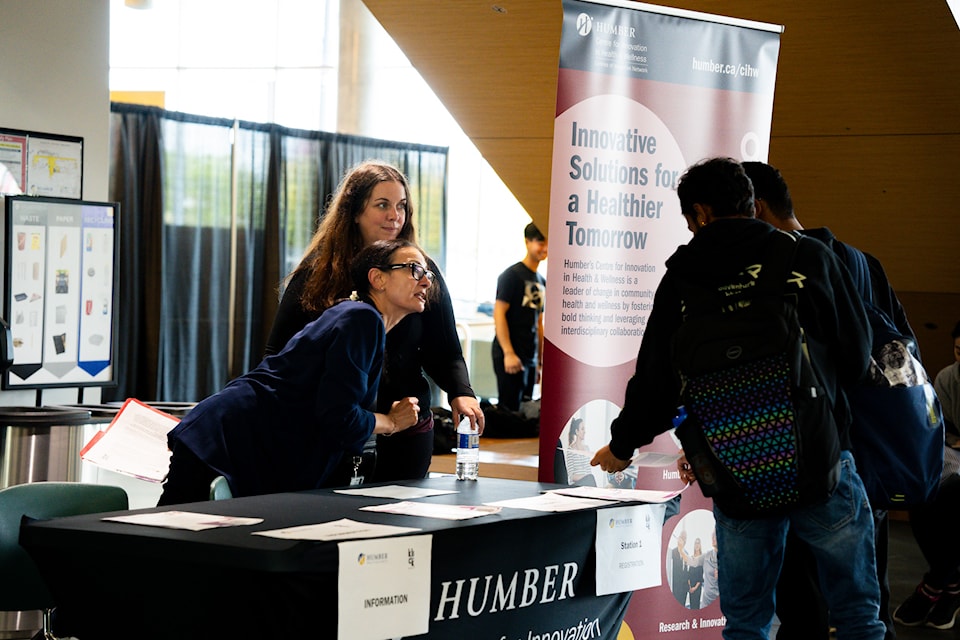Humber Polytechnic’s Centre for Innovation in Health and Wellness (CIHW) launched a new research study with Klick Labs to detect prediabetes using voice recognition technology.
The research study aims to improve awareness and understanding about health screenings for young South Asians, who may be at risk of developing Type 2 diabetes in the future.
Currently, more than three million Canadians, or 8.9 per cent of the population, are diagnosed with diabetes, a chronic disease that requires ongoing management and intervention.
The research targets the South Asian community, which faces a higher risk of Type 2 diabetes due to genetics, dietary habits, and lower Body Mass Index (BMI) thresholds.
This project is incredibly important, especially for early intervention,” said Vanita Varma, CIHW director.
“South Asians have a predisposed genetic tendency to develop prediabetes and Type 2 diabetes. With many South Asian immigrants living in Canada, we are focusing on education and prevention in this high-risk group.
Varma said many people may not realize they’re at risk as prediabetes often has no symptoms.
“A simple voice recording could help identify risks, prompting testing, and follow up with their health care providers,” she said.
Varma said there is a need for targeted healthcare solutions for the South Asian population, as their diabetes risk often goes unnoticed until it progresses to a Type 2 diabetes stage.
“This innovative, easy-to-use screening technology may change the landscape on early detection and prevention and thereby (allow) for early intervention and timely healthcare access,” she said, underscoring the CIHW's commitment to tackling health disparities in this community.
The study uses a machine-learning algorithm to analyze voice recordings for prediabetes risk factors. It detects subtle speech changes over just 10 seconds of voice data.
Participants speak into an app to help identify biomarkers in their voices that may indicate prediabetes risk. This method is non-invasive and accessible from any phone.
Varma said with excitement about the research, noting that this is the first time that this application is being used for young adults aged 18 to 30.
“We know that lifestyle and nutrition are critical for managing chronic conditions like diabetes. By targeting the younger population, we can instill healthy habits early,” she said.
With just a smartphone app and a short voice recording, individuals can participate in screenings without visiting a clinic or undergoing invasive tests.
“Many people are unaware of their risk until symptoms arise,” Varma said.
“This technology allows for proactive awareness, enabling individuals to make lifestyle changes before it’s too late,” she said, highlighting the project’s preventative focus.
Humber students Ayushi Gandhi and Karandeep Singh play vital roles as Research Assistants in this groundbreaking study.
Ayushi, a recent graduate from the Addiction and Mental Health program, said being part of the study is exciting.
“We are collecting data and contributing to an initiative that could significantly impact community health,” she said.
Karandeep, in his second program at Humber after graduating from the Research Analysis Program recently, said he enjoys being a part of the research team.
“It’s rewarding to be part of something that has the potential to help our community, especially as we focus on a demographic that faces significant health challenges,” he said.
The study’s findings could prove invaluable in raising awareness and providing preventive measures for prediabetes.
The Natural Sciences and Engineering Research Council of Canada (NSERC) has provided funding for this initiative through the Mobilize Research Grant, supplemented by contributions from Humber and Klick Labs.
Varma said the support shows how teamwork between different fields can help solve health problems.
As data collection progresses, the CIHW team anticipates sharing insights with the Humber community and beyond.
“The long-term goal of this study is to promote awareness and education around prevention,” Varma said.
She said after reviewing the results, the team plans to involve more students and look for new ways to encourage healthy living and prevent diabetes.
Community response to the initiative has been overwhelmingly positive, with over 100 students already participating in the study, Varma said.
“Our students have been fantastic in their engagement with this study,” she said.
Varma said the partnership between Humber and Klick Labs makes this research stronger and opens doors for future collaborations using technology to improve health.
“This is just the beginning. We are excited about the possibilities and the impact we can have together in the community,” Varma said.




